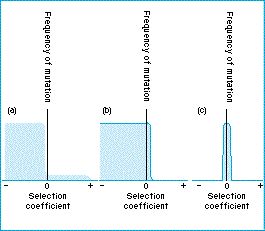Neutral theory

The neutral theory of molecular evolution contends that most evolutionary change at the molecular level is driven by genetic drift rather than natural selection.
The neutral theory does not suggest that random drift explains all evolutionary change: natural selection is still needed to explain adaptation. However, the neutral theory states that evolution at the level of the DNA and proteins, but not of adaptation, is dominated by random processes; most evolution at the molecular level would then be non-adaptive.
The neutral theory can be contrasted with the idea that almost all molecular evolution has been driven by natural selection.
The difference between the two ideas can be understood in terms of the frequency distribution for the selection coefficients of mutations, or genetic variants. Given a mutation of a certain selection coefficient, the theories of neutral drift and selection apply in a mathematically automatic way: if the selection coefficient is positive, the mutation increases in frequency; if it is negative, it is eliminated; if it is zero, the gene frequencies drift: there is nothing to dispute about here. The dispute is about how likely it is that mutations will arise with one selection coefficient or another to begin with.
The neutral theory, or neutralism, was first put forward by Kimura, and King and Jukes in the late 1960s and has become one of the most contentious issues in evolutionary theory. It should not be confused with pan-neutralism.
Figure: the neutral and selectionist theories postulate different frequency distributions for the rates of mutation with various selection coefficients. (a) According to the selectionists, exactly neutral mutations are rare and there are enough favorable mutations to account for all molecular evolution; whereas (b) neutralists believe there are many more neutral, and hardly any selectively favored, mutations. (c) is pan-neutralism, the theory that all mutations are selectively neutral.
| Next |



